#ladderback chair
Text
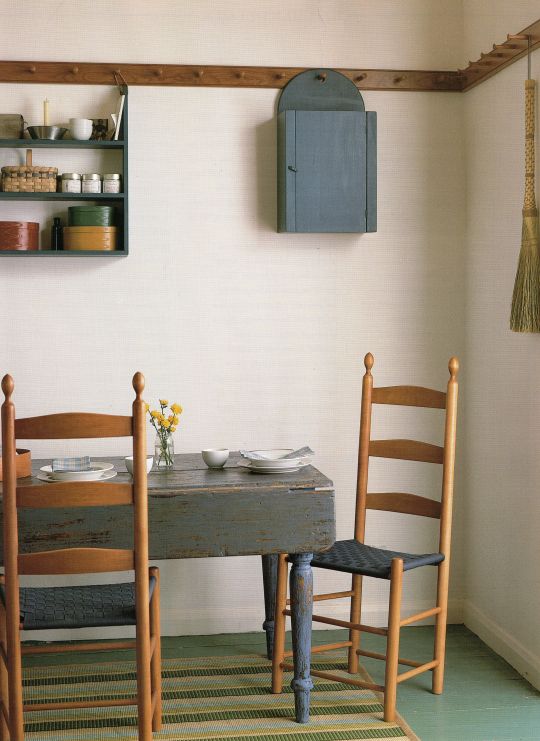
Country Kitchens, 1991
#vintage#vintage interior#1990s#90s#interior design#home decor#kitchen#dining room#country#Shaker#ladderback chair#style#broom#boxes#antique#furniture#early American#home#architecture
280 notes
·
View notes
Photo
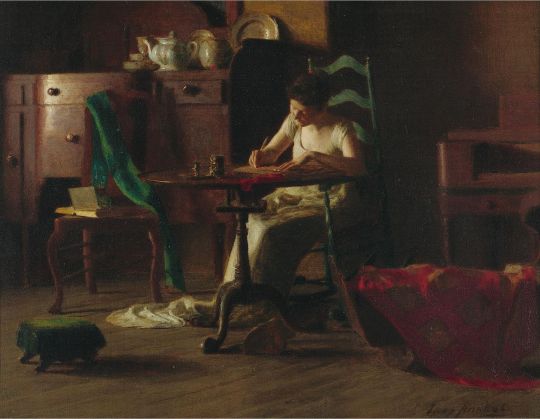
Thomas Anshutz
Woman Writing on a Table, c. 1905
Oil on canvas
#art#art history#american art#american artists#thomas anshutz#ashcan school#painting#woman#writing#table#interior#decorative arts#furniture#ladderback chair
5 notes
·
View notes
Text
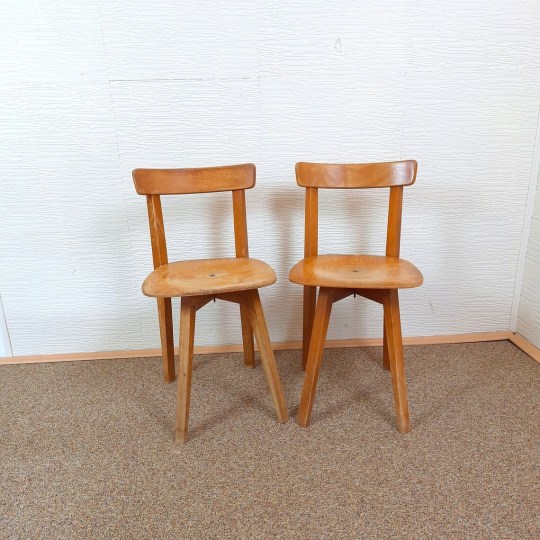
Vintage Set Mid Century Dining Wooden Chairs / Wood Chairs / Made in Yugoslavia 1960s / Funky Dining Chairs
#vintage#vintage interior#interior design#home decor#kitchen#dining room#country#Shaker#ladderback chair#style#broom#boxes#antique#furniture#early American#home#architecture
1 note
·
View note
Photo
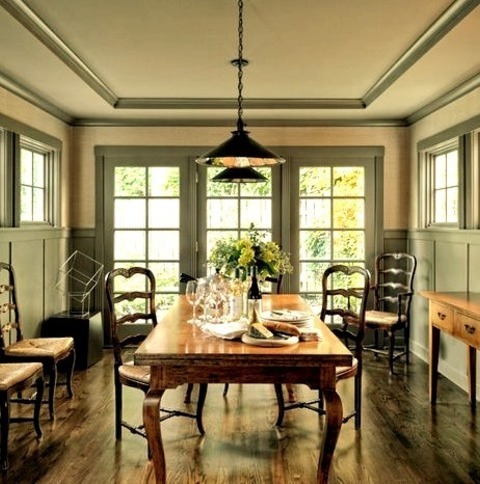
Dining Room - Enclosed
Image of a medium-sized, elegant dining room with a dark wood floor, gray walls, and no fireplace
0 notes
Link
#LittleThings#Chrysnbon Ladderback and Cane Seat Chair Cushions#Tutorial#by#my-miniaturemadness.blogspot.com#BEAUTIFUL WORK!#<3
0 notes
Photo
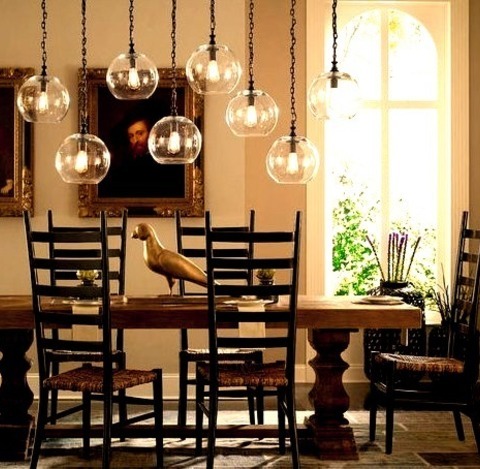
Dining Room Kitchen Dining
Inspiration for a large cottage kitchen/dining room remodel with dark wood floors and beige walls
0 notes
Photo
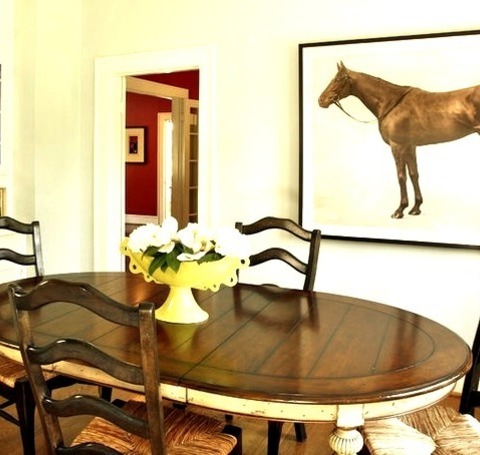
Enclosed Dining Room
Mid-sized classic enclosed dining room design example with blue walls and no fireplace.
0 notes
Photo
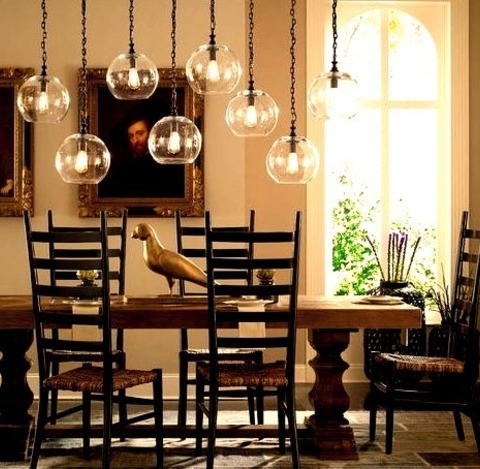
Farmhouse Dining Room (Indianapolis)
#Inspiration for a large cottage dark wood floor kitchen/dining room combo remodel with beige walls french style#farmhouse#ladderback chairs#rustic'#cool pendant lights
0 notes
Text



@benjhawkins found this lovely antique and likely locally made ladderback chair at a thrift store today and I drove like a fool over to take a look. Still in the original red paint and likely the original seat, with interesting long finials that remind me of the spokes on a ship’s wheel. She came home with us!
38 notes
·
View notes
Text

So, as someone who is really rather in love with Early American furniture, I thought I would take a few moments of your time to educate people a bit on it, specifically- 18th century furniture.
In the Sims Community a lot of people refer to the 18th Century as "Rococo", and most of what follows has a lot of white, pink, and gold involved. While that was certainly happening in Europe, particularly in France, in the colonies we weren't so fancy, even though people painted the hell out of their pine.
This is for obvious reasons- most colonists weren't very fancy people themselves, and a lack of craftsmen and a need for simplicity were the most obvious ones. So, we made furniture like this: The Ladderback Chair.
It's simple, it's utilitarian, and aside from the decorative finials on the top, it's pretty plain. And yet, it's light and elegant, which is why you can still find this design today, as long as you're not shopping at Ikea.
My absolute favorite when it comes to simple elegance is the Windsor Chair. After 300 years, you can still find this style, and the many variations it has, all over the country (including modern takes on the timeless design).
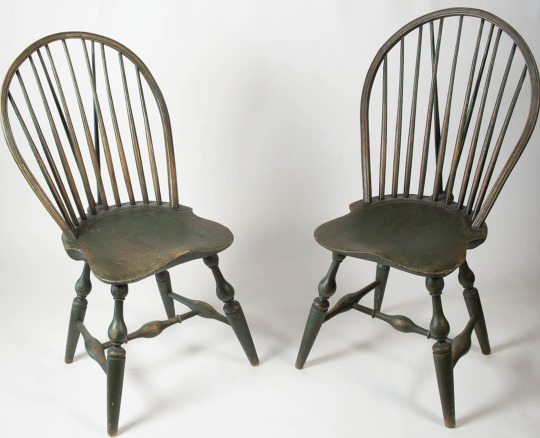
We have a few of these in our house, and I have to say how much I love them because they are so comfortable! The seat is fitted exactly for the backside, as each cheek is gently supported.The armchair we have in my house has arms shaped precisely to fit the body, and even the hand!
There are so many variations of the Windsor design, and craftsman started making them in this country early on. You've got your Continuous Arm, Fanback, Sackback, Bow-back and Combbacks. I see these chairs on offering from Sims creators, but they are rarely labeled correctly, mostly as "country" chairs.
I'm sure that's what we think of them as today, but the truth is they were everywhere, found in both upper-class and more moderate homes. And let's not forget how there weren't any power tools at the time, so craftmanship of these really needs to be viewed with that in mind.
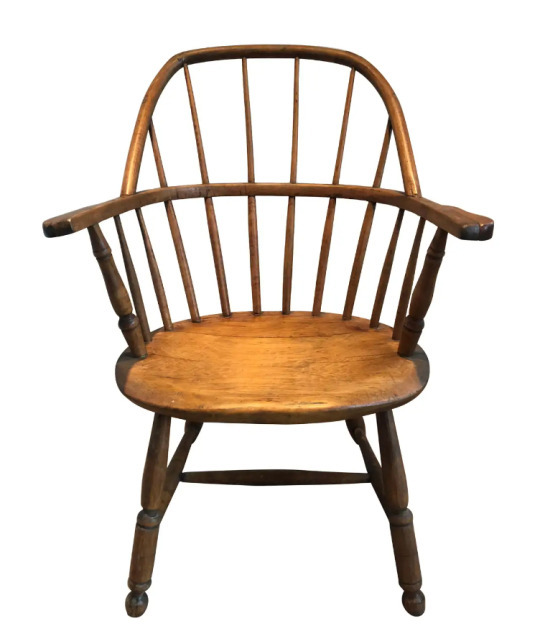

Today, these antiques and replicas can go for a very high price, but luckily for me they are all over New England, so they aren't too hard to find like some things.
Anyway, I'll talk more about this later, but can we please stop calling them "country" chairs? That's like calling every house from the 19th century a "farmhouse." Neither of which was ever an actual style until HGTV got involved.
If you really want to nerd out about it, and I hope you do, you can read more about the Windsor Chair here, in The Magazine Antiques.
22 notes
·
View notes
Text
At the Bookstore Cafe
After a long browse for some other story
to make of our lives, we sit in uneasy
truce over what she will or will not eat.
We drink our chamomile tea and pretend
I’m the good mother, she the good daughter.
Three more patients from the ward drop themselves
in chairs nearby, tripping the rictus scale
as she calls it. She looks at them like mirrors.
She baits me — “World-class starvation artists,
Mummy” — waving her empty cup toward them.
“You can’t quite say we ‘egg’ each other on,
can you? Not even that would pass our lips.”
I say nothing. My arm half lifts and falls.
Hunched in her ladderback chair, she would flinch,
scald, if touched, this flesh once safe, once perfect,
that grew inside me. So, we drink our tea.
A Starbuck’s barista in a bearsuit
brings them their rosehip and waddles away
to welcoming squeals from the Children’s Hour.
Once upon a time, I would have said,
“O children, frisk and play,
be good and stay away.
The poison’s sweet.
Beware the forest’s paths
and what they give to eat.”
Now, I don’t know. Her fingers like twigs tap,
tap at her cup. She looks past the tykes running
down the aisles, faces paint-whiskered as mice,
then slowly tears her napkin into confetti.
My hands lie in my lap like stones. Chairs scrape,
the sisterhood rises. I look at her,
at me; Witch or Gretel makes no difference,
we are ourselves our own ovens.
— Robert Bolick (source)
#At the Bookstore Cafe#Robert Bolick#autumnskypoetrydaily#poetry#writing#literature#motherhood#persona poem#poets on tumblr
3 notes
·
View notes
Text

This big room feels more cozy because the larger space is divided into smaller areas by the scale and placement of the fireplace.
The Not So Big House - A Blueprint for the Way We Really Live, 1998
#vintage#vintage interior#1990s#90s#interior design#home decor#dining room#floral#wallpaper#sunken#living room#fireplace#traditional#ladderback chair#style#home#architecture
254 notes
·
View notes
Text
Whumptober days 1-3
@whumptober-archive
prompts: “This wasn’t supposed to happen”, cornered, hair’s breadth from death
warnings: blood, vague descriptions of field care, cursing, reference to past torture, emotional manipulation (implied), physical whump, captivity, younger whumpee(s) (not specified but all of them are roughly 5-15yrs younger than whumper), multiple whumpees, emetophobia
characters: sidekick, villain, hero, henchman
1346 words
a/n: not edited
___
Henchman paces around the small room, muttering to himself. Every few seconds he stops and stares at Sidekick, who stands staring at him in the corner near the door, his hand resting on the hilt of his dagger with a foot up on the wall.
Sidekick takes a deep breath and resists the urge to shout at Henchman to just take a fucking seat and shut up. But, Hero told him to watch Henchman; so that’s what he’ll do. That’s what he’s done for the past three days. Even if Henchman’s muttering is more annoying than the way the rock in the tread of his shoe scraped against the floor every single time he takes a step. Even if his uneven breathing is more annoying than the rock in the shoe. Even if his constant movement was setting Sidekick on edge. Even if-
The door opens and Hero’s head pops in. “Hey,” he says, pulling Sidekick out of his thoughts. “Villain won’t say anything so I need you to leave.”
“Those two things don’t even remotely relate to each other.” Sidekick says. Hero steps into the room and Sidekick can see blood trapped under his fingernails. His mouth opens, “Oh.”
He walks out of the room and looks back at Henchman, now backed into a corner of the room, watching as Hero stalks towards him.
Sidekick looks away and wanders down from where Hero had come from. If he thinks hard enough, he can drown out the screaming from behind him.
The doors in the hallway are always closed, so it’s a guessing game for Sidekick to find the one holding Villain.
It’s easy enough to ignore the ones he knows the contents of. His room, Hero’s room, guest room, bathroom, laundry room, and so on and so forth. The basics all thrown into an abandoned two story apartment building.
He figures that Hero wouldn’t put Villain on the ground floor since it would be much easier for her to escape. But the second floor had much more valuable information. She could be in one of the closets, since they lock from the outside, but he doubts Hero would have put the effort of moving everything out to do so.
He opens a door, just to put his mind onto something else and when he pops his head in to look around the room, he nearly throws up.
Most of the carpet is soaked with blood and the room is hot. He opens the door all the way and pulls his shirt over his nose. It barely helps with the smell.
Villain’s hunched over, her hair in front of her face so Sidekick can’t tell if she’s awake or not. Although, with what he knows of Hero’s…interrogation tactics it doesn’t matter much.
The carpet squelches under his boot and he has to take a deep breath to keep the rising bile down. She’s tied to a ladderback chair, feet bound to the legs of the chair and arms tied behind her back, there’s a thick leather strap holding her up right under her throat and Sidekick can see irritated red skin around it.
He curses under his breath and walks behind the chair to undo the buckle. When he pulls against the strap to loosen it, Villain’s head shoots up.
She thrashes wildly in the chair, rocking it and nearly falling over with the force. He pulls his hands away from the buckle.
“Not Hero.” he says gently. Though, if she did hear him, she didn’t care. He walks in front of the chair and crouches down, pulling his shirt off his face and looks into her eyes. “I’m undoing this strap. Just sit still please.”
Her jaw juts out in defiance, but she stills and Sidekick walks around to the back of the chair again.
“Where’s Henchman?” she asks painfully. “Is he…”
“He’s fine,” Sidekick says. “Or. He was when I last saw him.”
“When.”
“Just before I came here. Hero needed to be alone with him.” he pauses.
She tenses and takes a deep, shaky breath. “Is he going to…”
“I-I don’t know. I hope not.” Sidekick shakes his head and finishes with the buckle, letting the leather fall to the floor. “I don’t think he will.”
Villain slouches forward, arms the only thing keeping her from falling all the way forward. Sidekick takes the strap in his hands and throws it to the other side of the room.
“He can’t die. Not like that. He deserves so much better,” she whispers. “If Hero kills him…it’s all my fault. I told him to stay home but he followed me. There was enough time to get him somewhere safe before you and Hero ambushed us but-”
“Hero won’t kill him. Right now he’s got leverage. He knows that.” Sidekick says. And he prays he’s right. He clears his throat. “Do you want me to treat some of these? I almost have a medical degree.”
She scoffs. “How do I know you won’t do something to make them worse?”
“Wait two days and you’ll probably die of infection.” he snaps back.
She stares at him and blinks. “Treat them, don’t treat them. I couldn’t give a fuck either way.”
He takes a deep breath and leaves the room.
As soon as the door closes, he runs to his room and grabs his bag. He puts on two masks in an attempt to dull the smell, but he knows it probably won’t help.
The hallway is eerily quiet on his walk back to Villain’s room and he knows Hero’s done with whatever he was doing and would be looking for him soon.
He ignores the smell by some miracle and patches up the worst of what he can see, after just forty-five minutes he’s nearly satisfied.
Almost fifty stitches litter her skin, gauze over what he didn’t think would stitch up nicely, he wrapped a few fingers that had been broken and gave her quite a few painkillers.
“This is probably all you’re gonna get. Hero won’t be happy I’m doing this for you so I won’t be able to come back unless you’re dying.” he says, closing the lid to the bottle and stuffing it in the bottom of his bag.
“You’re a weird one, Sidekick,” she says, almost smiling. “Why are you with Hero? You could do so much more good with literally anyone else.”
The bag zips and he stands up, throwing it over his shoulder. “It really wasn’t supposed to happen like this. Hero was the good guy, you know? He fought the big bad and saved everyone. Now it’s too late to leave.” he coughs and looks around the room, making sure he hadn’t missed anything when he was picking everything up. “I’ll try to convince Hero to let you heal up some. No promises. Don’t do anything stupid and tell him what he wants to know. I’ll do my best to take care of Henchman. Just…stay alive. Okay?” he sniffs and leaves the room again.
Hero’s in his room. Sitting on his bed, flipping through one of his picture books. He sets the book spine-up on the bed and stands up.
“I’ve been waiting for you.” Hero says.
Sidekick takes a deep breath and drops his bag on the floor. “I was treating Villain.”
Hero bangs his fist on the dresser next to him and picture frames fall with the impact. “Did I ask you to do that?” Before Sidekick has the chance to respond, Hero answers for him. “Of course you didn’t. Because you just do whatever the fuck you want to whenever the fuck you want to. You’re lucky we’re on the same side because if we weren’t I would have killed you ages ago.”
Sidekick takes a deep breath and clenches his jaw. “She was going to die if I didn’t do anything. You need her to tell you about Supervillain. She can’t do that if she’s dead.”
“You don’t go back in there. Understand?” Hero spits on the ground and pushes past Sidekick.
“Yes, sir.” Sidekick whispers.
#whumptober2022#whumptober#no.1#no.2#no.3#whumptober day 1#whumptober day 2#whumptober day 3#my writing#em writes#em writes stuff#whumper#whumpee#hero#villain#sidekick#henchman#whumper hero#whumpee villain#whumpee sidekick#whumpee henchman#emotional manipulation#tw blood#this wasn't supposed to happen#cornered#hairs breath from death#tw emetophobia
10 notes
·
View notes
Text
Getting to Marigold
Chapter One
Mushroom, Raw Umber, Tobacco
A mole’s nest.
A dark, stuffy mole’s nest.
That’s what Bernie’s bedroom is, sniffed Jeanie Dinmont.
A dark, stuffy mole’s nest where—for the last fourteen years!—my daughter has chosen to burrow her silly head.
Gazing around the offending room, Jeanie was stumped.
Why, she wondered for the trillionth time, had Bernie—back when she was a cantankerous sixteen-year-old—cruelly demanded that they chuck the lovely ivory-and-cream French Provincial décor—with pops of cherry-blossom-pink!—which her mom had so lovingly designed?
And for what?
For the Gothic-Victorian-techno mishmash of her current dismal lair?
What a waste of effort! Jeanie had mourned at the time. And, frankly, she hadn’t seen the need to let Bernie have her own selfish adolescent way. In her opinion, the sweetly feminine bedroom had been perfect for a young lady of tender years and, at the time, she’d wished that her daughter would just leave it alone.
Yes, well…
As Jeanie’s mother would say, ‘If wishes were horses, beggars would ride.’
The hollow-eyed teen had moped and sighed and sulked and pined, until—bowing to her best friend Sylvie’s parenting advice—Jeanie had yielded to Bernie’s unfathomable desire to transition her room into a ‘more grown-up space.’
Still—loathe to give up all aesthetic control—Jeanie had energetically counselled her daughter on how to curate her attic retreat.
“Now, kidlet—with these small windows and sloping ceilings,” she’d cautioned, “you’ll want to keep everything light. A neutral palette is the ticket here. So, if I were you, I’d switch out those ivory pieces with a blond Danish-modern suite. And then freshen up that matte cream wall paint with a semi-gloss buttermilk hue...”
But had her daughter listened?
Nope.
Not a chance.
Stubbornly insisting on her own dour notions for the space, Bernie had pushed her perplexed mother to repaint and then cram far too much dark-walnut furniture against stodgy mushroom-gray walls.
Next—during an increasingly rare mother-and-daughter shopping jaunt to Sears—the cranky teen had opted for equally bleak soft furnishings.
Then, she’d staged a weekend hunger strike—which her scrawny body could barely abide—in order to gain a plush area rug in a regrettable shade of raw umber.
And, to complete the desecration, she’d insisted that her pleasant sitting area be transformed into a video gaming lounge!
So, now, an olive-drab duvet smothered the heavy Victorian double bed. A battleship-grey slipcover obscured what had once been a delicate ladderback desk chair. And over Bernie’s flat television screen lurked ugly posters featuring the sombre wizards, pointy-eared boys and snarling white wolves from her ghastly video games.
The window treatments were no better.
Inky-black roller shades masked every pane. And tobacco-brown curtains shrouded each implacable shade so that Bernie could never be startled awake by even the slightest stray hint of rosy dawn.
No sunlight. No birdsong. No air…
Gee whiz, grimaced Jeanie. I’d go mad if—even for a single night!—I had to endure this frumpy old nest. Let alone for the past fourteen years…
Still—once she’d let Sylvie persuade her to allow the gawky girl dress her third-storey refuge to her own leaden taste—Jeanie had to concede that her best friend had been right.
Concede that Sylvie had understood far better how to assuage the pain of Bernie’s murky adolescence and her ensuing prickly twenties than Jeanie had ever wanted to.
Concede that Sylvie—a seasoned campaigner in the teenage wars with her flamboyant son, Nick—had been entirely correct when she’d warned Jeanie to forfeit the small battles to Bernie and save her energy for the big conflicts to come.
Yes, but—
Where was Sylvie now?
Gone.
Gone forever…
And that, decided Jeanie—vigorously refusing to be slurped into an insidious bog of regret—that abandonment, no matter how involuntary, certainly meant that now—right now!—Jeanie was allowed to decide for herself that enough was enough!
With her usual deliberate stride, she wooshed across the deep-piled rug to the window, threw back the heavy curtains, snapped up the roller shade and wrenched open the double hung window.
A waft of mid-July heat met the chill of the air-conditioning and died on the sill.
“Jessica Bernadette Todd!” she carolled in her cheeriest voice. “Rise and shine!”
Beneath the heavy duvet, a slight figure stirred. Then, an unaccountably tidy head of dark-brown hair turned to reveal hazel-grey eyes peering dully out of a small pale-white face.
“Mom.”
With that single word, Bernie neatly expressed everything she wanted to say.
Don’t fool around with my window. Leave me alone. Go away.
Jeanie decided to ignore it all.
“The day’s a-wasting!” she chirped. “It’s time to greet the sun!”
Her beloved kidlet—never ‘Jessica’ since that September afternoon when she’d announced that, with three other Jessicas in her fifth grade class, she would henceforth be known as ‘Bernie’—dropped a limp hand over to her bedside table to consult her phone.
“Mom.”
It’s only nine-thirty on a Sunday morning. Close my drapes. Leave me alone.
Bernie’s pallid face swivelled inexorably back towards the wall.
Jeanie decided to ignore that too.
Leaving the window wide open, she nipped over to her daughter. Tugging off the unspeakable duvet to reveal Bernie’s frail powder-blue flannel-wrapped back, she plopped herself down on the bedside for a bracing chat.
“Look, Bernie—” Jeanie began. “If our loopy-neighbour-from-three-doors-down, Lindy Styre, can get over herself long enough to write a summer play, you can get over yourself long enough to get up and go see it.”
Bernie’s hibernation remained undisturbed.
“Oh, for pity’s sake, kidlet!” Jeanie continued, relentlessly. “According to the radio, Loopy Lindy’s done such a cracker-jack job, her theatre group’s gone and scheduled a whole extra matinee in the Glebe today! Now, the show starts at one. And I know that—if you stop for breakfast—it’ll take you at least an hour to get up and out. So, I thought that, after you’ve had your shower and got dressed, we’d hike over to Starbucks for our coffee and then trot across the Bank Street Bridge. Once we’re in the Glebe, we’ll pick up a snack—and then window-shop our way up to the park—”
Heaving a deep-dark sigh, Bernie flopped back over to confront her intolerably perky parent. “Mom. There was a headline in the Old Ottawa South paper that said Excursion Theatre’s coming to Windsor Park in early August. Why can’t we go then? It’s not as if this matinee’s a case of now-or-never.”
Delighted with this multi-sentence response, Jeanie seized upon her daughter’s argument with gusto. “See? You’re planning to go see Loopy Lindy’s play. Why not take advantage of this lovely golden day? That August date could be rained out and then we’d miss everything!”
“Mom—”
“So why not sling our folding chairs over our shoulders and march on down through the Glebe? We’ll buy fresh bagels, and it’ll be so much fun—!”
“Mom—” groaned Bernie, attempting to retreat beneath her bedclothes once more.
But Jeanie had scented victory in her daughter’s former lengthy reply.
“Oh no, you don’t!” she laughed, wrestling the awful duvet from Bernie’s feeble grasp and tossing it to the floor. “We’re overdue for a Girls Day Out! So, get cracking, kidlet! And I’ll go rustle up those chairs…”
Filled with happy purpose, Jeanie scampered down two flights of stairs to her blond maple kitchen. There, her husband, Donald Todd—an unpretentious man in his late sixties who’d recently retired from the Federal civil service—sat on a caramel-leather-upholstered stool at the pink-granite-topped kitchen island. He was just as fair-skinned as Bernie and three inches shorter than his long-limbed wife of almost forty-two years. And, as he sipped his second cup of coffee, he was puzzling through the cryptic crossword from yesterday morning’s paper.
Always the intellectual, thought Jeanie, indulgently. Can’t simply do the regular crossword like the rest of us mortals…
Don had popped his golf shirt collar up on one side, so Jeanie straightened it out for him. Then, planting an airy kiss on his greying temple, she offered, coyly, “You’ll be glad to hear that your devoted wife and darling daughter won’t be underfoot for most of the day.”
“But I’ll miss you both so sadly,” returned Don, evenly. Without even a glance his wife’s way, he filled a long word into his puzzle grid.
“We’re having a Girls Day Out. No men allowed!” Jeanie brightly informed him as she disappeared into their recently refreshed mudroom. There, she pulled a couple of bagged folding chairs out of the closet and leant them against the wall. Now, she thought with satisfaction, those will be close at hand...
Returning to the kitchen, she double-checked that the box for today’s date on the Inuit art wall calendar was empty. She wanted to fill it in with the lively acronym ‘GDO!’ But where was the pen that ought to be laying on the shelf nearby?
“Don,” she asked, “have you seen the calendar pen?”
“Mmm…what?”
“The calendar pen. The one that we always leave here on the shelf.”
The pen wasn’t on the counter. It hadn’t been knocked to the floor. So where was the calendar pen?
Had somebody moved it on purpose?
Jeanie felt a buzz of frustration arise in her mind.
“Not this one, is it?” Still concentrating on his crossword, Don waved the pen he was using at her. “I found it over there somewhere.”
Jeanie’s mouth pursed in to a strained smile.
“You know, Don,” she admonished her husband, as if spelling out an indisputable fact to a little child, “you should leave the calendar pen where it belongs. Then—whenever we need it—we won’t have to search all over the house.”
“Sorry, dear.” Don kept reading his puzzle clues and, again, didn’t bother to look up at his wife.
“And I know that you don’t mean to be careless. But it doesn’t take much to throw everything into disarray.” Jeanie didn’t like to be a nag. And since it was only about a month ago that Don had reluctantly retired from the long days of his government career, he could be forgiven for not being on board with her household routines. But there was a limit to her patience. “If you start picking up stuff at random and just using it for whatever, pretty soon the whole system will be in a shambles.”
Don nodded thoughtfully and wrote another answer. “As soon as I’m finished, I’ll put it back,” he said. And—although her fingers itched to grab the pen out of his selfish hand—from long experience with her husband’s talent for sly evasion, Jeanie knew that she had to be content with that.
Restlessly, she surveyed the kitchen. What other mischief had Don been up to? There weren’t any of his used breakfast dishes cluttering up the counter or the sink, so she unobtrusively checked in the dishwasher to see if he’d put them away correctly.
Aha! Don’s cereal bowl was in the appropriate slot on the bottom rack. But he’d stuck his juice glass in the widest row of the upper…
Juice glasses go in the narrow outer row, frowned Jeanie. Any fool should know that.
With an air of great tolerance, she lifted the offending glass and placed it in its proper spot. Then she snapped the dishwasher closed and, with a pen selected out of her cache in her kitchen junk drawer, wrote ‘GDO!’ in today’s calendar box.
With her good mood restored, Jeanie placed the substitute pen on the designated shelf and turned to Don with an unfeigned smile. “Don’t you wonder where your girls are going?”
Don glanced up briefly from his puzzle and took a swig of coffee. “Oh, I’m sure you’ll eventually tell me,” he said.
“We’re off to see that play that Lindy Styre wrote.”
“Uh-huh.”
“It’s got great reviews, and they’re doing a matinee today in the Glebe. So, Bernie and I thought we’d give it a peek.”
“Great.” Don’s slate-blue eyes drifted back to his crossword.
“It’s supposed to be really funny.”
“No doubt.” He picked up the ex-calendar pen again and wrote.
“But you can’t come with us—”
“Mm-hm…”
“—because we’re having an exclusive Girls Day Out!”
His brow wrinkled in deep thought, Don looked up and past his wife to stare vaguely at a spot over the kitchen stove. So, giving him up as a bad job, Jeanie retrieved her phone from its charging bay to check for messages she might have missed while she was upstairs rousing Bernie.
There was nothing too important. Just a reminder from the clinic about Jeanie’s follow-up mammogram. And a text from her former boss, Roberta Tsang.
Nearly twenty years ago, Roberta had hired Jeanie as a part-time receptionist at her Bank Street interior design company. And, now, she was asking whether Jeanie would like to come bargain hunting at the Westboro garage sale next Sunday?
Jeanie deftly texted Roberta that she’d ‘love to go pickin’!’ and ‘how ’bout lunch too?’ And then stuck the details of the medical appointment into her phone calendar.
‘Done like dinner,’ as Sylvie would have said.
‘All good and proper!’ as Jeanie’s mother would amend.
Pocketing her phone, Jeanie ran up the back stairs to refresh her lipstick in her marbled en-suite bathroom. Once there, however, she paused to admire her newly-dyed hairdo in the vanity mirror.
Keenly aware that her aging Clear Spring complexion now benefitted greatly when she lightened her colour palette to a Pastel Spring’s lower intensity hues, she’d instructed her stylist to tone her hair down to a soft-honey tint. She wasn’t ready to go grey, she’d explained. But she certainly didn’t want to look like one of those desperate ladies in their early sixties who try to offset their wrinkles with a brash shade of copper or platinum blonde…
Then again, Jeanie was a realist, and she wasn’t going to hide from the fact that she was getting old. Yet, even with their fortieth anniversary in the rear-view mirror—and a year’s hiatus during her health scare—she and Don were still having it off a couple of times a month.
I might be vintage, Jeanie reminded the smiling woman in the mirror as she lightly touched up her coral lip gloss, but I sure ain’t antique!
As usual, Jeanie had dressed very carefully this morning and, assessing her appearance in the mirror on the back of her bedroom door, she was quite pleased. She hadn’t painted too much tawny colour on her cheeks, and she liked the nice summery effect of the plain gold hoops in her ears. Her flowery aqua cotton top bloused enough to disguise any imbalance in the size of her breasts and, with a nod to her mature status, she’d opted for a pair of faded denim-blue shorts which left only a tasteful stretch of her long legs bare. And—playing peek-a-boo with her neatly coral-polished toes—sprightly new espadrille sandals completed her flawless attire.
“You look like a million dollars!” she told her beaming reflection and giggled when it responded with a duck-lipped super-model pose.
Next, knowing that—even at the best of times—Bernie never moved fast in the morning, Jeanie detoured for a few minutes to her craft room, which was located across the hall from the guest bedroom on the second-floor. She wanted to finish cutting and filing a couple of articles from her favourite women’s magazine.
Of course, Jeanie knew very well that this was the age of the computer. But, in some fundamental way, she preferred winnowing real pages to simply downloading images from a screen. And she wasn’t about to give up her favourite hobby just because it wasn’t modern…
In fact—through years of careful scrutiny of homemaker’s magazines—Jeanie had assembled a tangible ‘vision’ of what her family’s life should ideally be. And via scrapbooks, files and inspiration boards, she continued to pursue that vision with passion and zest.
Now, donning her reading glasses, Jeanie flipped merrily through the latest issue’s glossy pages. She clipped illustrated instructions on how to host a gingham-themed summer picnic. And then a page of chowder recipes with both seafood and vegetarian options. She usually filed the ‘Simple Sewing Crafts’ feature, as well as the fantasy vacation pages, so she plied her scissors there too. Then, making sure that the paper remained uncreased, she stashed the articles into appropriately multi-colour-labeled folders, ready to be pasted into one of the many tidy scrapbooks that lined her craft room shelves.
Gratified with this bit of orderly housekeeping, Jeanie skipped up to the third floor to monitor her daughter’s progress. But—
There wasn’t any.
Or, at least to Jeanie’s mind, there hadn’t been.
Perhaps, in Bernie’s opinion, there had.
The window was once more firmly shut. The inky-black roller shade was pulled down and the tobacco-brown curtains had been yanked across. The olive-drab duvet had been restored. And it was painfully obvious from the bedclothes’ unruffled façade that the small silent bulge beneath hadn’t moved since Bernie had rearranged her mole’s nest back to her own heavy dark taste.
Wordlessly Jeanie stood and stared dumbfounded at her daughter’s dead heap. She felt like she’d been slapped in the face with a wet fish…
And then blistering incredulity replaced her initial shock.
How could any kid of mine, gasped Jeanie’s mind, so brutally reject my efforts to engage her in the wonderful al fresco pleasures of life? Haven’t I tried beyond hope to understand her ridiculous reserve? Haven’t I given her the benefit of my sunny philosophy every single day?
So, why this obstinate refusal to participate in a cheery Girls Day Out?
As my mother would say—'What’s the worst that can happen? What doesn’t kill you, makes you stronger, girl.’
So, get out there in the fresh air and have a ball!
It all seemed so easy to Jeanie. But then again—as she was the first to admit—tolerating the personal quirks of her deeply loved but totally mystifying kidlet had always been the major challenge in her life.
Jeanie had miscarried multiple times before Bernie had finally been born, and the doctors had decreed that she’d have no more kids. So, there went her plan to have a troupe of children skipping through the halls of the three-storey, two staircase, six-bedroom, white elephant of an Edwardian red-brick house that she and Don had optimistically purchased in Old Ottawa South.
Then, Bernie had been a difficult, hyper-sensitive baby, hard to put to sleep and often screaming with colic. And—long past the ‘making shy’ stage—her finicky daughter had strenuously objected to strangers. So, Jeanie’d had to shelve her new scheme of housing international university students too.
No matter, she’d rationalized, and industriously repurposed the four superfluous bedrooms instead. On the second floor, she’d allocated a study for Don and a craft room for herself. And, in the two bedrooms on the third, she’d set up a box room for storage and—in the larger one—a quaint gabled playroom for her only child.
But then it had turned out that Bernie’s immune system had been massively unforgiving of even hypoallergenic pets. Reluctantly, Jeanie’d had to re-home their Labradoodle dog and Balinese cat. And, for the last twenty-eight years, the only animals in their home had been the mindless goldfish swimming endlessly around their bowl in Don’s study.
So, no brothers or sisters or boarders. And not even a furry pet…
With puberty, of course, Bernie had insisted on moving her bedroom up to the third floor. And—remembering her own dramatic middle school years—Jeanie had indulged her twelve-year-old kidlet’s sudden need for privacy. Efficiently, she’d hired a builder to tear down the wall of small attic box room and install another full bathroom for Bernie’s exclusive use. And then she’d happily decorated her daughter’s new en-suite bedroom and sitting area in that delightfully feminine ivory-cream-and-pink colour scheme.
Next, the generous walk-in closet in Bernie’s former second floor bedroom had been renovated to become Jeanie’s and Don’s en-suite bath. And—after purchasing an antique birdseye-maple bedroom set which included a spacious wardrobe—Jeanie had refurnished the remaining space for the use of overnight guests.
But then, as an ungrateful older teen, Bernie had stubbornly chosen that woeful attic décor. And—all the way through her Carleton University days and right into her nerdy government computer system analyst career—she’d persistently ignored her mom’s every encouragement to brighten it up.
Unfortunately, to Jeanie’s mind, thirty-year-old Bernie seemed to be stuck in a teenage funk. And—equally unfortunately—the end of their tense mother-daughter journey seemed to be nowhere in sight.
Which was because—as far as Jeanie knew—her persnickety kidlet had never led a normal social life. No gang of gal pals, no best friend and not even a whiff of romance had given a dash of spice to her daughter’s achromatic existence. Day in and day out, she’d simply slunk off to class or to work. Or sat at a computer. Or stared at a phone…
And when, a couple of years ago—at Jeanie’s urging—Don had offered to help with a substantial down payment, Bernie had balked at moving into her own place.
So, it had become increasingly obvious to Jeanie and Don that their daughter wasn’t planning to decamp anywhere else anytime soon.
Holy doodle, grimaced Jeanie. Imagine a thirty-year-old woman deliberately living at home with her aging parents. Still single and perfectly content to be buried alive in her dark, stuffy mole’s nest—
That was Bernie in a teacup!
And now, Jeanie realized, bitterly, the world’s most exasperating daughter wasn’t even going to disturb her self-centred agenda to venture forth on a rare Girls Day Out with her long-suffering mom!
Swiftly, Jeanie’s incredulity morphed into fury. And—aware that she was on the edge of saying or doing something unforgiveable—she abruptly spun on her heel and swept down the back stairs to the kitchen where Don still struggled with his puzzle.
“Bernie’s not coming!” she snapped. “Your daughter won’t even get up out of bed!”
“She won’t?” returned Don without looking up from his crossword. “What a surprise.” With a grunt of pleasure, he filled in one of the last two answers and, surveying the final clue, nonchalantly offered a helpful suggestion. “Maybe you could call somebody else to go with you. Probably Sylvie—oh, dear god, Jeanie, I’m so sorry—!” Too late Don realized his indefensible mistake and, red-faced, sprang up from his stool to give his wife his full attention. “Jeanie, I didn’t mean to—!”
But there was really no excuse.
“She can’t be bothered—and you don’t mean to—! That’s the story of my life!” snarled Jeanie, snatching her light summer tote bag from its peg. “But don’t let it bug you, Don! Sylvie may be gone. But I’m not beaten yet! I’m going to Lindy’s play—all by myself!”
Helpless with guilt, Don shrank back on his stool.
And, ditching her miserable husband, Jeanie stomped into the mudroom, seized her folding chair and slammed through the side door to face the pitiless hot and sunny world.
Alone.
#original novel#interior design#grief/mourning#satire#family#parenting#home lifestyle#theatre#family reunion#1920s#summer theatre#best friends#gettingtomarigold
2 notes
·
View notes
Text
Broken Dreams - A Maggie Oneshot
Summary: Maggie's aspirations of becoming a violinist are dashed.
TW: angst, language, etc.
WC: 2.3K
1958
She sat in the ladderback chair, the wooden instrument resting against her chin. Bow held high like a sword, Maggie began to lively strum again from her bedroom. The window was propped open so Sharon could hear the progress while sunbathing on the porch.
At least her sister was supportive where their parents failed to be in every way; she was Maggie’s only life preserver in the ocean that was Buffalo. But Sharon wouldn’t be there to keep her afloat forever. Ignoring the intrusive though, the young woman continued to strum out another sonata.
Strings taut and biting into soft fingers, she remained lost in the symphony until the door was creaking open. Carol peaked her head in, timid smile painted with mauve lipstick.
“Oh, sorry.” stopping with a screech, Maggie’s attention fell to her mother. “Was I being too loud?”
“Of course not, dead.” Sneaking into the room, the older woman’s smile began to wane. Eye’s becoming sympathetic, an open envelope was held out to the young woman. There was an argument to be had about privacy later, but at least Carol’s expression softened the blow. Especially when steely blue eyes recognized the insignia stamped across the front.
The Juilliard School.
“Let me take your fiddle,” painted fingernails wrapped around the neck of burnished wood. With a swift tug, the violin was out of freckled fingers. Her mother was trying to be helpful but only knew how to be smothering and assertive. Smoothing out her yellow linen skirt, shaking fingers undid the already opened letter.
She already knew it was a rejection. It was a long shot, but it still stung. Bleary eyes skimmed the words, finding empty an ‘thank you’ and ‘unfortunately’ peppered in. Carol had opened every letter first as though it was her given right to. An ‘I told you so’ without actually having to say the words, followed by being there to comfort her daughter as she wept.
Thankfully, Maggie had been numb at this point and hadn’t needed placation from her mother. Her parents’ apathetic words about a ‘pipe dream’ raced through her mind. Maybe they were right. And it seemed timely to replace the instrument in its case, lest it be broken across the nightstand in frustration. Gently retrieving the violin, she balanced its proper home across knobby knees.
“Y’know,” Carol wrang her fingers apprehensively, “Maybe you should think of applying to the university here in Buffalo.”
“I have,” Maggie eyed her mother shamefully, “I was accepted for their nursing program.”
“That’s wonderful!” Carol was ecstatic, smile stretched garishly wide. “Why didn’t you say anything?”
“It’s not what I wanted to do, mother.” Maggie sat the case on her bed before standing. Padding over to the window, blue eyes wistfully fell upon idyllic suburbia. A couple school children spun around the cul-de-sac on cherry red bikes while the neighbor dutifully mowed an already trim lawn. Clouds hung low and fluffy in a clear blue sky. There had to be more to life than just plainly existing here. Carol’s hands gently fell on Maggie’s shoulders as she continued to gaze out into the plain abyss.
“Aren’t you happy to be able to give back to the community? You can really help people in medicine.”
“I wanted to make music. Uplift people’s spirits.” She countered sadly.
“That’s a nice dream, honey.” Carol placated dully, “But some dreams are meant to be just that. Besides, that’s rather silly. Let the professionals make music.”
“Professionals have to start somewhere.”
“Sharon got her nursing degree.” It wasn’t a new argument though it was still salt in a festering wound.
“I’m not Sharon.” Stomping into the carpet like a petulant child, she knew her argument was weak.
“Don’t be cross. It’s not becoming.” Carol was quick to let go of Maggie completely, traipsing back to the door. “Tommy’s here. I made a little picnic if you’d like to take a blanket and spread out in the yard.”
There was a lone creak of a rusty hinge, leaving the girl by herself to ponder about the future.
*.·:·.☽✧ ✦ ✧☾.·:·.*
“You really just want to lie here and watch clouds?” Tommy fidgeted beside his girlfriend on the gingham blanket. He was tall and muscular, taking up more than half of the space allotted. Though Maggie was determined to keep his attention off of a bikini clad Sharon sunning herself on the patio.
“Yeah,” Maggie shrugged, squeezing his hand in her own. “You don’t find it calming?”
“I dunno,” he groaned, “I thought after we ate those sandwiches we could go back to my place. My parents are gone for the weekend.”
“Maybe you can go play ball with the boys.” She suggested, pretending not to hear a lewd comment whispered in a huff. Tommy only remained loyal to Maggie as they’d started going steady freshman year before he joined the football team. Their interests continued to skew apart though Carol and Lou thought the two were destined to marry. Especially after Sharon’s messy split with her boyfriend left them hopeless.
God forbid their daughters became old spinsters.
But Maggie hoped that opposites truly did attract and that she and Tommy were meant to be. After all, she didn’t want to head to college single. Having a boyfriend for so long made the thought absolutely terrifying. Not to mention the fact that she was sure this would be her only chance to not die alone.
“I heard back from Julliard.” She spat out nervously, watching a fluffy cloud take the shape of a horse. He was silent for a moment before humming lowly.
“Good news?” his voice was one of disinterest.
“No.” Maggie added with a hopeless sigh, wishing for any form of comfort.
“Well, maybe it’s for the best. You can go to a real school.”
“It is a real school.” Pouting, she wondered if any of her dreams were actually viable. Sharon had been the only person to give any vote of confidence; unfortunately, whatever confidence the young woman instilled was dashed away by the consistent negativity.
Sitting up, the red head glared at boy. In spite of being nineteen, Tommy still acted like a child. Forever immature as she reached a high peak of maturity for the age of eighteen. Hugging her knees, Maggie felt like a like a little girl trying to lasso the moon.
Everyone was painfully vocal about this fact, believing her talent to have plateaued years earlier. Maybe they’d been right. Regardless, the thought didn’t quell the tears from bubbling up.
“What did I say?” Tommy sat up in surprise, reaching out to stroke her arm. Shuddering at the clamminess of his hand, Maggie felt herself retch. Was this going to be her entire life?
He continued to prod to no avail. No answers were given as she remained sullen and silent. What was there to say to someone who wouldn’t listen?
“Lover’s spat?” Sharon stood at the edge of the yard, hands on her hips. She had been silent in her approach, having gone unnoticed by hormonal turmoil. Still shining with oil, blonde hair was pinned atop her head.
“Hey, Shar,” Tommy obviously gawked at a bare midriff, “Maggie’s just having a moment.”
“I’m not having a moment!” she snapped, tears now flowing freely, “Maybe I don’t want to be like everyone else.”
“Head home, Tommy.” Sunglasses were pushed down to reveal bright blue, “Pippi and I need to have a talk.”
“But I didn’t even a get a chance to thank your mother for lunch.” The boy sputtered, obviously overwhelmed by the situation.
“I’ll extend the gratuity to Carol. Now’s a good time to skedaddle.” Not wanting to argue, Tommy awkwardly unfolded himself to a shaky six feet before bidding Maggie a worried goodbye. The blonde watched as he shoved balled fists into a bulky letterman jacket before disappearing behind the garage.
“Boy’s a rube.” Sharon chuckled, dropping onto the blanket beside her sister.
“He doesn’t like being called a ‘boy’. Says he a ‘man’ now.” The red head sighed, chin propped on crossed arms.
“Being nineteen doesn’t make you a man. He’s got a lot of living to do before that happens. Not sure what you even see in that meat head.”
“He’s sweet. Deep down.”
“Must be really deep down. But that’s not what I want to talk about. There’s something bugging you.”
“It’s not a big deal,” wiping at watering eyes, the younger woman attempted to steel herself. “Just got myself all worked up.”
“Doubtful. You’re weepy but there’s normally a reason behind it.”
“Julliard doesn’t want me either.”
“They’re very prestigious. It’s not like you didn’t try.”
“Nobody wants me or my violin.”
“That’s not true.” Sharon cooed, pushing her sunglasses back up. “I think you’re very talented. But it’s about convincing other people to take a chance on you.”
“I wish mom and dad thought that.” Titian waves floated in the breeze as cobalt eyes stared into the distance.
“Mom and dad don’t make or break your dreams.”
“But maybe dreams stay that way for a reason. Did you always want to be a nurse?”
“My story isn’t as interesting.” The blonde nudged their shoulders together. “I just didn’t want to be a homemaker like mom. Comparing stories isn’t fair to you, Mags.”
“I applied for the nursing program at Buffalo.” The admission was added flatly.
“And?”
“They accepted me.”
“You don’t sound excited.”
“I don’t know. If that’s my only option. Maybe I’ll learn to love it.”
“Maybe.” Sharon sighed wistfully, “But don’t sell yourself short, Margaret. You don’t want to be filled with regret the rest of your life.”
1972
The case sat there, collecting dust on the top shelf of the closet. Forgotten, it was a reminder of the path not taken. The strings biting into her fingers until they were bloody, a small price to play to become a concerto like she’d dreamt of.
Making a living checking for scoliosis and handing out peppermints, Maggie oft daydreamed of what it would be like to play with the philharmonic instead. Toting a pile of freshly folded towels to the closet, the linens were neatly tucked away.
Heavy eyes lingered on the pastel bath towels before glancing up to the forlorn instrument. Standing on her toes, slender fingers grasped through the handle. Pulling it down in one fell swoop, Maggie caught the case against her chest. The weight felt comfortable, familiar. Padding over to the sofa, the instrument was placed on the coffee table. Undoing the snaps found the instrument still wedged into velvet lining.
Still shiny, like it had been waxed and lacquered yesterday.
Fingers ghosted over the burnished wood as though it was a waning mirage. Maybe it would crumble to sand if she actually touched it. Yet, it didn’t. And like a day had hardly passed, Maggie remembered exactly where beneath a round chin to prop the instrument, how to hold the bow.
Maddy investigated the forgotten case, nearly knocking it to the ground. Though the red head could hardly worry about the curious feline before tentatively plucking a few strings. Warped and garbled, it was terribly out of tune. Wincing at the slice of sound, Maggie ceased playing before falling into the sofa.
The bright rays of the golden hour shifted to a rosy mist as night fell quickly amongst the brownstones. Children playing outside slowly abandoned now empty sidewalks as the neighborhood grew silent. Other than a chorus of crickets and the odd car horn, the woman basked in the quiet. Fingers raw from plucking and testing strings, the bow was brandished once more. Breath held in a tight chest, C minor was played smoothly, celebrated by a following D major, then G major…
Grinning wildly, Maggie played a few more chords before celebrating.
They’d been wrong. They were all wrong. She hadn’t forgotten. It wasn’t pointless.
How could something so pointless light her heart so brightly up? If nothing else, it made one person happy. And that was enough.
1976
Strumming lazily, Maggie lay flat against the shag rug. Major lay curled to one side as another ballad was softly strummed.
“I’ve looked a love from both sides now, from give and take and still somehow…”
Words were soft and light, barely a whisper against the music yet still overpowering. It was a rarity, but Maggie would play for hours once in a blue moon. Baez morphed into Dylan into Young into Mitchell, song after song.
Elias felt like he was in a trance, curled on the sofa as his lover sang sweetly about love and loss. Every song seemed more personal than the last, plucked from the folds of a once aching brain. Now sung from a soaring psyche, it was the song of a bird with mended wings.
A mesmerizing sight, curls spread across the carpet as the woman grinned and hum.
“It’s loves illusions that I recall. I really don’t know love at all…”
“Anyone ever tell you that you sing like an angel?” chin propped in an upturned palm, Elias continued to study her. Setting the violin aside, Maggie rolled onto one side. Blunt teeth playfully dug into a pink lower lip.
“You’ll make me blush.” Heart soaring, she couldn’t remember the last time she’d felt so carefree.
“It’s a little late for that.” Elias grinned toothily, eyes crinkling slightly. Maggie giggled shyly, blowing the man a kiss before rolling to her back once more. Fiddle pressed proudly under her chin, blue eyes were suddenly on a matching pair.
“Any requests?”
“Anything. Just don’t stop serenading me, songbird.” Stretching out on the sofa, Elias folded his arms behind a heavy head. His leg didn’t hurt so much with spring slowly heating the Earth, allowing him a moment’s relaxation. Life finally made sense, especially with Maggie there to be his light in the dark.
“It ain’t no use to sit and wonder why, babe. If you don’t know by now…”
Voice lilting somberly through the living room, they’d both even contend that maybe heaven did exist after all.
2 notes
·
View notes
Text
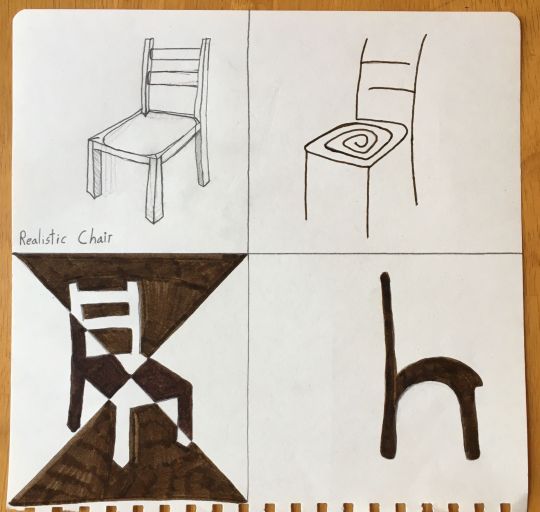
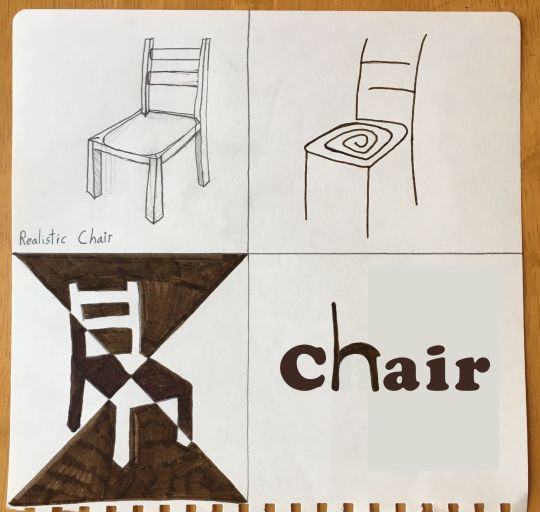
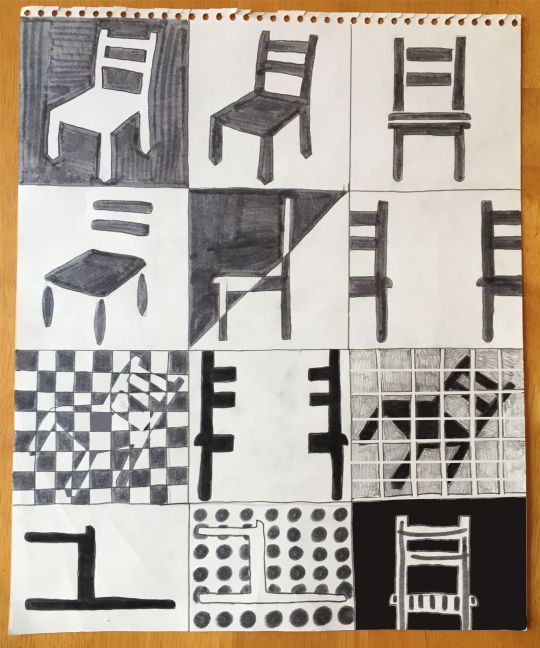
The Gestalt Principles describes how humans group similar objects, recognize patterns, and simplify complex images. These principles are divided up into five categories: proximity, similarity, continuity, connectedness, and closure. Artists and Designers of all types use it to organize content and make it appealing. It's also great for building logos.
For this topic's assignment I had to take an object and simplify it. Breaking it down to abstract lines and shapes. This project was fun and stimulating! I will definitely use this method in the future to make logos and banners in business cards and websites.
I stuck with my ladderback chair image and deconstructed it.
#abstract art#art#artwork#chair#chairs#design#Gestalt#gestalt principles#illustration#drawing#shapes#lines#pencil drawing#traditional art#logo art#symbols#eddc#everydaydrawingchallenge#everydaydrawing
3 notes
·
View notes